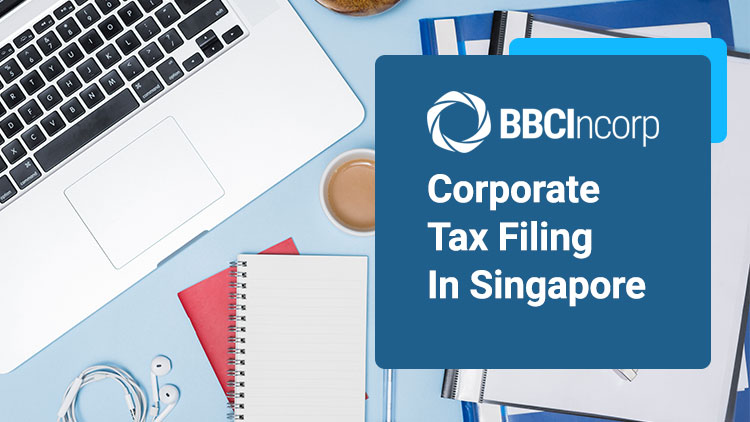
Your company must comply with corporate tax filing requirements in Singapore. There are 2 types of tax returns that your company has to file with the local tax authority. In certain cases, your company can be eligible for a simplified return or even filing exemption.
Each Singapore tax return has a different filing deadline. Singapore corporate tax filing deadline can vary according to the chosen financial year end and the year of assessment.
This blog presents to you all the basics so that you can ensure the company complies with the Singapore tax filing obligations in the right way.
Time basis for company tax filing in Singapore
Your company’s income earned in a financial year (FY) will be assessed and taxed in the following year. This following year is known as the year of assessment (YA).
You can pick a financial year end (FYE) to determine the financial year of your company. In Singapore, FYE can fall on any given date of the calendar year.
Most companies choose 31st December to be their FYE. Other common options are the last day of each quarter. If you choose FYE differently from 31st December, please inform the Inland Revenue Authority of Singapore (IRAS). It is the government agency that is responsible for all tax matters in this country.
Some examples:
| FYE | FY | YA |
|---|---|---|
| 31 Mar | 1 Apr 2019 – 31 Mar 2020 | 2021 |
| 30 Jun | 1 Jul 2019 – 30 Jun 2020 | 2021 |
| 31 Dec | 1 Jan 2020 – 31 Dec 2020 | 2021 |
note
If your company’s FYE lasts longer than 12 months, you must also inform IRAS. When filing Singapore tax returns, you must report and attribute the company’s income to two years of assessment.
For instance, your company was incorporated on 1st August 2019 and the chosen FYE was 31st December. You informed IRAS that the first financial year (or financial period) would last for more than 12 months. The financial period would be from 1st August 2019 to 31st December 2020.
When filing Singapore tax returns for reporting, you must attribute and report the company’s income according to the following 2 years of assessment:
- YA 2020 covering the financial year from 1st August 2019 to 31st December 2019, and
- YA 2021 covering the financial year from 1st January 2020 to 31st December 2020.
A smaller note: If you haven’t known how your company’s income is taxed and at what rates, you are recommended to read our previous blog on Singapore corporate income tax before moving on.
Types of Singapore tax returns
For tax filing in Singapore, there are 2 types of returns:
- Estimated Chargeable Income (ECI)
- Form C/C-S/C-S Lite

Estimated Chargeable Income
Estimated Chargeable Income (ECI) is an estimate of your company’s income that will be taxed after deducting all allowable expenses. Along with ECI, your company will also need to state its revenue.
However, your company can be exempted from filing ECI with IRAS if it meets the following conditions:
- The revenue in the financial year is no more than 5 million, and
- The ECI is nil in the year of assessment.
You do not need to inform IRAS about the fact your company will not file ECI since it satisfies the conditions.
Form C/C-S/C-S Lite
Form C/C-S/C-S Lite is a report of your company’s actual income. It provides a much more detailed picture of your company’s finance, compared to the ECI report. You will have at least 11 months to prepare and file this form with IRAS after a financial year ends.
Form C-S
Form C-S is a simplified version of Form C. It has twice as fewer fields to fill in. Form C-S helps small businesses to simplify their company tax filing in Singapore.
Your company is qualified for Form C-S when meeting the following criteria:
- It is incorporated in Singapore
- Its revenue in the financial year is no more than 5 million
- All sources of income are subject to the corporate tax of 17%*
- The company does not claim any of the following in the year of assessment:
- Carry-back of current-year losses or capital allowances
- Group relief
- Investment allowance
- Foreign tax credit and tax deduction at source
*You should not file Form C-S when the company receives concessionary tax rates for certain types of income.
Form C-S Lite
To further relieve the burden of corporate tax filing in Singapore for small companies, the government has introduced Form C-S Lite in 2020. Currently, it is the simplest Singapore tax return. It has as few as only 6 main fields.
Your company can be eligible for filing Form C-S Lite when the following criteria are met:
- Your company satisfies all the conditions for Form C-S, and
- Its annual revenue is no more than $200,000.
Form C
If your company is not eligible for either Form C-S or Form C-S Lite, it must file Form C for Singapore tax return. Besides such form, you need to submit audited or unaudited financial statements, tax computation, and other supporting schedules.
Corporate tax filing deadlines in Singapore
The due dates for the two Singapore tax returns are:
| Singapore tax return | Due date |
|---|---|
| ECI | In 3 months after a financial year end |
| Form C/C-S/C-S Lite | 30th November in the year of assessment |
From YA 2020, your company is required to e-file Singapore tax returns with IRAS. Here are some timeline examples for corporate tax filing in Singapore:

Example 1: Your company’s financial year end is 31st December:
- The financial year in which income is generated: 1st January 2020 – 31st December 2020.
- The year of assessment in which income is assessed and taxed: 2021.
- The due date for filing ECI: 31st March 2021.
- The due date for filing Form C/C-S/C-S Lite: 30th November 2021.
Example 2: Your company’s FYE is 30 June:
- The FY: 1st July 2020 – 30 June 2021.
- The YA: 2022.
- The due date for filing ECI: 30 September 2021.
- The due date for Form C/C-S/C-S Lite: 30 November 2022.
How to file Tax Returns in Singapore
For corporate tax filing in Singapore, you need to log in to MyTax Portal with your company’s CorpPass. You can do the filing by yourself or entrust this task to any person or tax agent who has your company’s CorpPass accounts. With the accounts, they can log in to the portal and e-file your company’s Singapore tax returns.
Here is a general process of filing Singapore tax returns:
Step 1: Read the instructions published by IRAS for filing ECI or filing Form C-S/C.
Step 2: Log in to MyTax Portal with the company’s CorpPass account and then verify via SMS (or OneKey Token).
Step 3: On the menu bar, click on “Corporate Tax” and choose “File ECI” or “File Form C-S/C” according to your intention.
Step 4: Start the filing process according to the instructions published by IRAS.
Post corporate tax filing in Singapore
After reviewing your company’s tax returns, IRAS will send you Notices of Assessment by 31 May the following year. This is the due date for companies that have straightforward businesses (these accounts for around 90% of the company population in Singapore). You will have 1 month to pay the corporate tax which is mentioned in the Notices.
If there is a big difference between the taxable income reported in Form C-S/C and that reported in ECI, IRAS may request an explanation from you.
Late corporate tax filing in Singapore may cause fines or summons of directors for tax liabilities, depending on IRAS’s decision.
Conclusion
For corporate tax filing in Singapore, your company must file ECI and Form C/C-S/C-S (Lite) with IRAS. For the former, the corporate tax filing deadline in Singapore is within 3 months after a financial year end and for the latter is the last day of November in the year of assessment.
From YA 2020, your company is required to e-file Singapore tax returns. You need to log in to MyTax Portal and start the filing. After the returns are viewed, IRAS will send you Notices of Assessment. You then will need to pay your company’s tax in 1 month according to the amount finalized in such Notices.
Should you have any questions about the Singapore taxes, please contact us for answers!
Disclaimer: While BBCIncorp strives to make the information on this website as timely and accurate as possible, the information itself is for reference purposes only. You should not substitute the information provided in this article for competent legal advice. Feel free to contact BBCIncorp’s customer services for advice on your specific cases.
Get helpful tips and info from our newsletter!
Stay in the know and be empowered with our strategic how-tos, resources, and guidelines.


